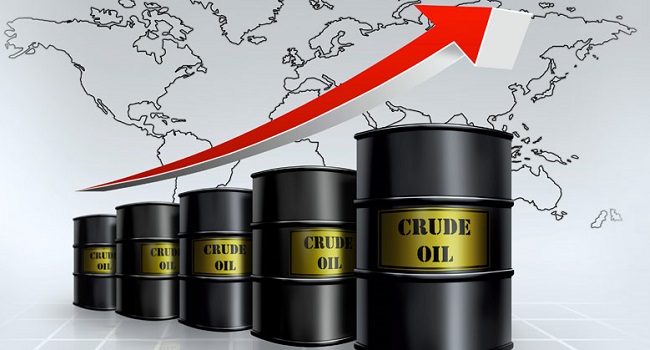Business
Tough times ahead for Nigerian states as oil price nears $90

Oil prices continued their surge on Wednesday, trading at a level never seen under the administration of President Muhammdu Buhari.
Reports from Bloomberg showed that on Wednesday, Brent, the benchmark for Nigerian oil, closed at $88.29, the highest level in seven years.
The rising oil price was attributed to rising tension in Middle east countries and there are projections it could hit $90 and $100 in coming days.
The projection is based on the fact that agitators at the middle east are not willing to stop after hiting pipeline linking Iraq and Turkey.
The dual face relationship between international oil price Nigeria economy could mean big problems ahead.
On the face value the rise in oil price should mean more revenue, but with Nigeria producing below capacity and heavy reliance on petrol importation it means more money is set to go into subsidy payment.
Data from Organisation of Petroleum Exporting Countries (OPEC) product latest report showed Nigeria again missed out on huge oil revenue as its oil production declined by 78,000 barrels per day (bpd) last December 2021.
While other major oil producers increased their production and agitating to pump more, Nigeria’s December 1.19 million barrels per day production was at per with Angola.
OPEC uses secondary sources to monitor its oil output, but also publishes a table of figures submitted by its member countries.
According to secondary sources, Nigeria’s production decreased to 1.33 million bpd in December from about 1.38 million bpd in November 2021 compared to its OPEC quota of 1.61 million bpd.
States to feel the pinch
Nigeria’s poor oil production could see NNPC paying subsidy to ensure pump price stays low, and is a double edge sword for the economy.
Read also: Oil price hits US$81, as Nigeria struggles to produce enough to sell
Ripples Nigeria had earlier reported how in the first 11 months of 2021, NNPC the sole importer of petroleum products to Nigeria, paid extra N1.16 trillion to cover the cost of rising international oil prices.
This expectedly affected how much NNPC was able to remit to the Federation Accounts Allocation Committee (FAAC) in the 11-month period and onward distributions to states who rely heavily on it.
Figures from NNPC shows that while it made N2.99 trillion in 11 months, only N522.203 billion was paid to FG accounts as others went into operations and majorly subsidy payment.
With Oil prices now trading closer to $90 and might increase further the burden of subsidy payment is set to increase while there is not much oil for sale to cover the burden.
Join the conversation
Support Ripples Nigeria, hold up solutions journalism
Balanced, fearless journalism driven by data comes at huge financial costs.
As a media platform, we hold leadership accountable and will not trade the right to press freedom and free speech for a piece of cake.
If you like what we do, and are ready to uphold solutions journalism, kindly donate to the Ripples Nigeria cause.
Your support would help to ensure that citizens and institutions continue to have free access to credible and reliable information for societal development.
























